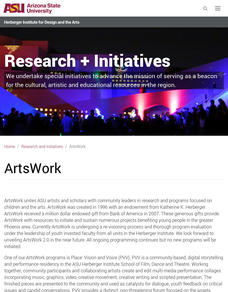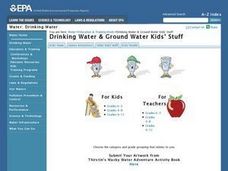Baylor College
How Much Water Do Humans Need?
Physical or life science learners measure the amounts of water eliminated by intestines and the urinary system, and the amounts lost via respiration and perspiration. In doing so, they discover that the body's water must be replenished...
US Environmental Protection Agency
Non-Point Source Pollution
Investigate the different types of pollution that storm drain runoff carries into oceans, lakes, rivers, and streams with this class demonstration. Using an aquarium and an assortment of everyday items that contaminants like motor oil,...
Curated OER
Water
Third graders study different bodies of water and how they fit into the water cycle. They explain that materials exist in different states (solid, liquid and gas) and change from one to another, that there are systems, order, and...
Curated OER
The Great Water Hunt
Students examine a globe to locate the bodies of water present and create a representation of those bodies of water for further exploration of the concept. Extensions of their observations are made at school, home, and the community.
Curated OER
Investigating Properties of Water: Temperature
Investigate how temperature affects the density of water and stratification that occurs in bodies of water when temperatures vary. Water of differing temperatures is given different colors to see the layers that form. The lesson is meant...
National Wildlife Federation
Water, Water Everywhere?
Visibly display the location of the water in the world. Using 12 liters of water to represent the total amount of water in the world, the class measures out the water located in different areas, such as the ocean and ice caps. Class...
University of Waikato
Water Temperature
Water temperatures connect to the movement of the ocean. Pupils read two articles about the temperature and the motion of the oceans before small groups investigate the interaction of hot and cold water. Team members add cold and hot...
Pace University
Water Cycle
Rain, rain, go away—wait, there it is again! Elementary scientists learn how rain works its way through the stages of the water cycle with a series of classroom lessons and hands-on activities.
Curated OER
Animal Survival - Water and Waste
Here is a very simple set of slides to complement your lecture about the importance of water for animals. It includes a table of where we gain liquid from, the chemical reaction for aerobic respiration, how we lose water, and how ADH and...
Curated OER
WATER HERE AND THERE
Introduce the topic of water conservation with a little drama. Dressed as snowflakes, hail stones, or rain drops class members dramatize the events in a narration of the water cycle. The series of lessons that follow focus on...
American Museum of Natural History
What's the Big Deal About Water?
It may seem simple, but water is one of the most unique substances on Earth. An interactive online lesson describes its properties and importance in so many different situations. Learners interact with the lesson to learn the role water...
Curated OER
I Just Drank George Washington's Water!
Guide your learners through the water cycle with this lesson plan. Over the course of the lesson, they read two Magic School Bus books, discuss the water cycle, come up with water facts, complete a diagram of the water cycle, recognize...
Curated OER
Water Cycle Reading and Writing
Here is a great way to get pupils to express a scientific concept in a fun way. After hearing the story of Walter the Water drop and learning facts about the water cycle, the class will write a creative expository piece describing what...
Curated OER
The Wonders of Water - Biology Teaching Thesis
Students name 3-5 aesthetic values of the Potomac River. They state the importance of water in their own words. Students describe what Earth Day is and why it is important. They list 5-7 ways that they can help minimize water pollution.
Curated OER
Water Cycle Reading and Writing
After listening to a story about the water cycle, learners create their own versions of this tale. This is a great way to have your class review the concepts of evaporation, condensation, precipitation, and runoff.
Curated OER
Understanding the Water Cycle
Investigate the water cycle and how water moves from the land to the air and back to the land. Create a terrarium and observe the water cycle at work. Define weather terms including evaporation, condensation, and precipitation.
Curated OER
Watershed Tourist
Students recognize and categorize different bodies of water. In this watershed and water environments lesson, students "Follow the Water from Brook to Ocean." Students define the different bodies of water and sort from smallest to...
Baylor College
Water in Your Body
Do you know how much water you have had in the last 24 hours? Do you know how much your body needs? In this hands-on activity, your class members will estimate how much water our bodies lose each day by filling and emptying one-liter...
Curated OER
Unit 1: Water is Life: The Heart and Science Behind this Phrase
Water, water, everywhere — but will there be enough to drink? Check out these detailed lesson plans to meet NGSS water cycle and CCSS literacy standards in your science classroom. Learners do a close reading of a challenging, poetic text...
Curated OER
The Water Nearby
Students explore water located near where they live. In this map skills maritime activity, students use Google Maps to find their school and the body of water closest to them. Students research the body of water and answer questions...
Curated OER
Map of Pennsylvania's Waters
In this labeling bodies of water in Pennsylvania learning exercise, students observe a map outline of the state with water sources and use the word bank of names of creeks, lakes, reservoirs, and rivers to identify them. Students label...
Curated OER
Youth Activity: How People Get Their Water Reservoirs: "Holding Tanks" for Drinking Water
Students experience and participate in "Riding the Water Cycle" with this lesson. They explore, analyze and study the role of reservoirs in maintaining a reliable supply of drinking water. Each student constructs a model of a reservoir.
Virginia Department of Education
Molar Heat of Fusion for Water
How can you describe heat of fusion in a way the class understands and relates the importance of this concept to present day issues? In this third lesson of the series, learners conduct an experiment, demonstrating the flow of heat...
Early Childhood Learning and Knowlege Center
My Body My Senses
In a comprehensive unit of activities, learners explore the five senses. Youngsters discover the many different body parts and their functions that allow humans to have sense of sight, touch, smell, taste, and hearing. The best way to...
Other popular searches
- Landforms and Bodies of Water
- Major Bodies of Water
- Bodies of Water/rivers
- Bodies of Water Lesson
- Identifying Bodies of Water
- Different Bodies of Water
- Bodies of Water 101
- Water Bodies
- Bodies of Water Word Scramble
- Landforms and Water Bodies
- Earth's Bodies of Water
- Healthy Bodies Water

























